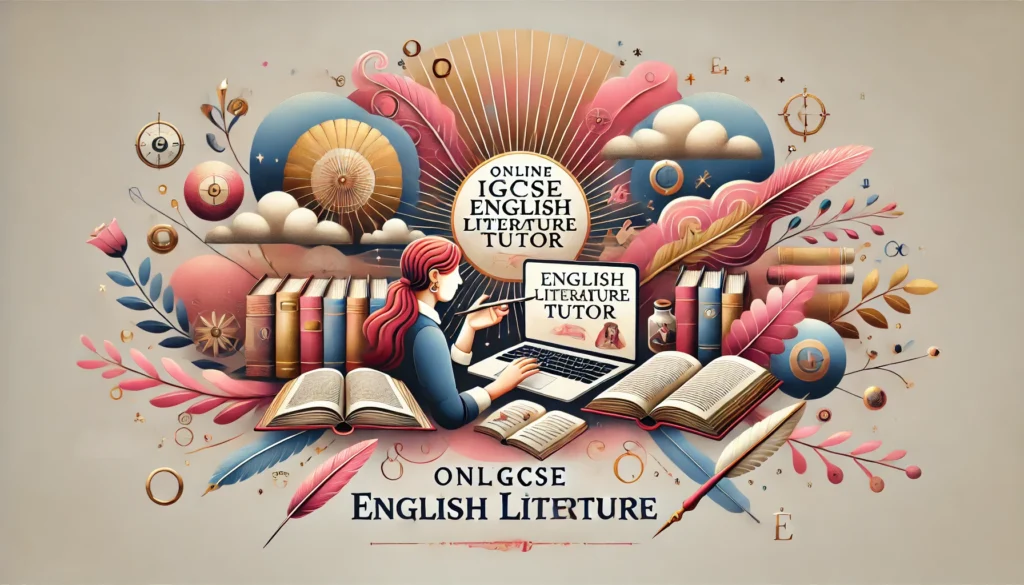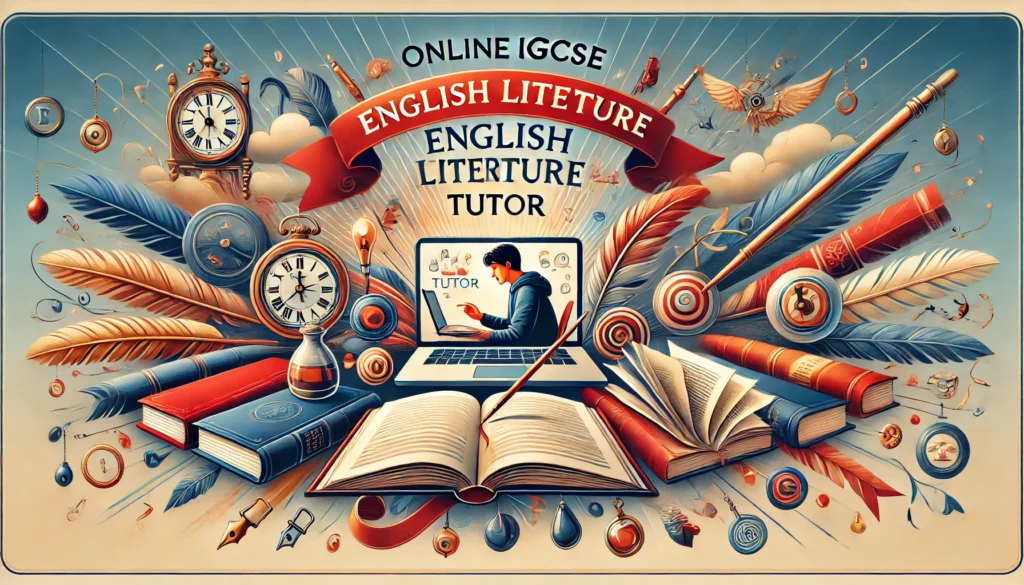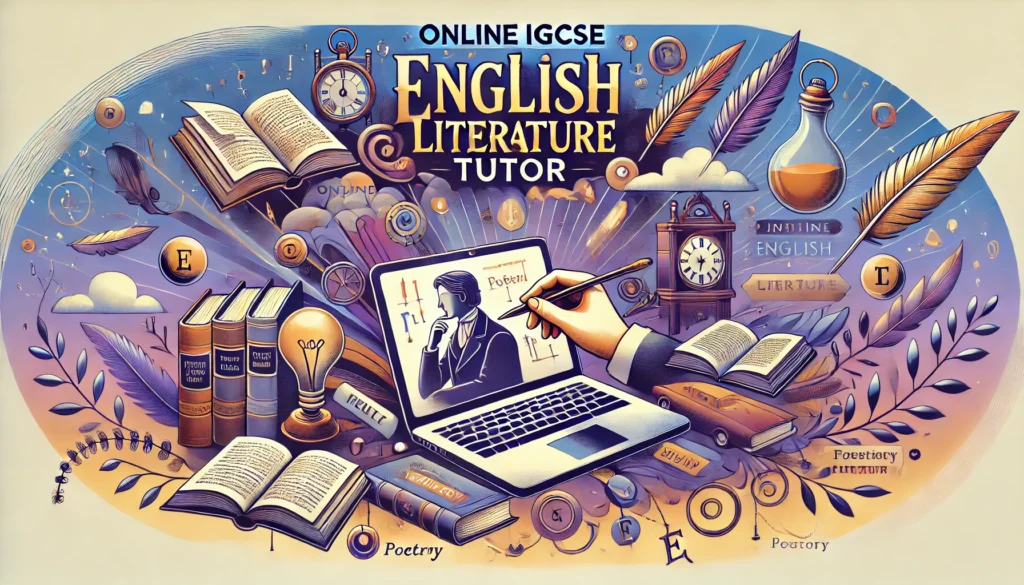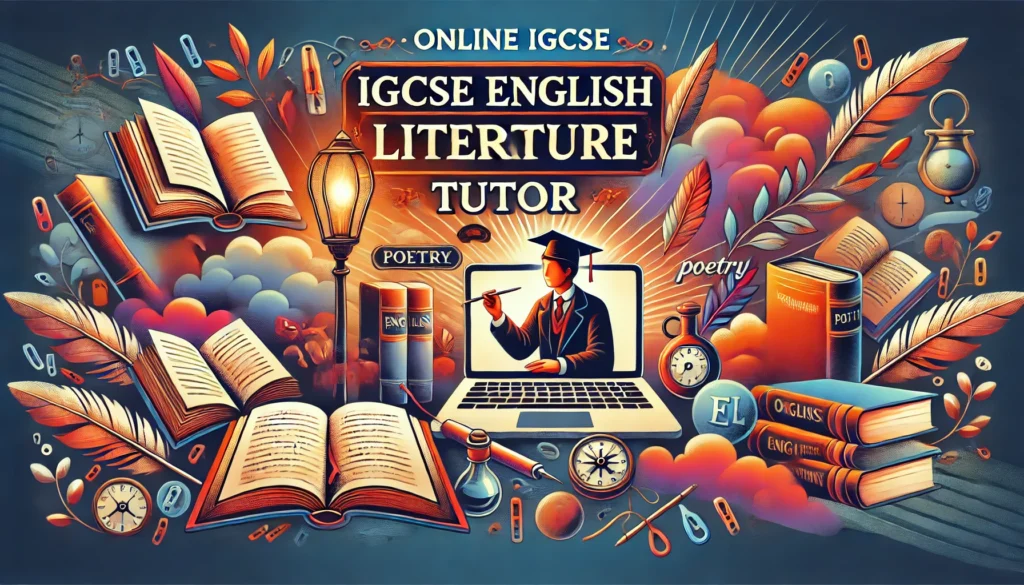Cambridge IGCSE English Literature (0427) Tutor
At Noble Learners, our Online IGCSE English Literature Tutor program is tailored to guide students through the complexities of the Cambridge IGCSE Literature syllabus. We offer personalized, interactive online tutoring that covers poetry, prose, and drama, preparing students to excel in their exams and develop a deep appreciation for literary works.

Why Study English Literature ?
Studying IGCSE English Literature enhances critical thinking, writing, and analytical skills. It is an essential subject for students interested in pursuing higher education in humanities, law, media, and more.
Why Choose Noble Learners for IGCSE English Literature Tutoring?
Expert Tutors:
Our highly qualified tutors are experienced in teaching the Cambridge IGCSE English Literature syllabus. They help students understand the nuances of literary analysis, develop critical thinking, and improve writing skills.Interactive Learning:
We use modern tools to create an engaging learning environment where students explore literary texts through discussions, quizzes, and practical exercises. Our goal is to help students build confidence in their literary analysis and exam techniques.Personalized Approach:
Every student learns differently. Our IGCSE English Literature Tutors design lessons that suit the student’s pace and style, ensuring that they grasp the key concepts and excel in their exams.

IGCSE English Literature Syllabus Overview
Our IGCSE English Literature Tutor program follows the Cambridge syllabus, preparing students for success in their exams. Key areas covered include:
Poetry
Analysis of selected poems, focusing on themes, tone, structure, and literary devices. We guide students in appreciating the depth of meaning in each poem.Prose
In-depth study of novels and short stories, exploring narrative techniques, themes, and character development.Drama
Detailed analysis of plays, both classical and modern, examining character interactions, dialogue, and thematic elements.Unseen Texts
Students will practice responding to unseen prose or poetry texts, developing their ability to interpret and analyze new material under exam conditions.
1. Paper 1: Poetry and Prose (1 hour 30 minutes, 50 marks)
This paper covers both poetry and prose, requiring students to demonstrate their understanding and interpretation of these texts. Students must answer two questions—one on poetry and one on prose, both with equal marks.
Section A: Poetry
- Candidates must answer on a selected set of poems. Each poem is examined for its themes, language, structure, and deeper meaning.
- Poems are provided in the examination, with students required to present a detailed analysis focusing on literary devices, tone, and narrative style.
Section B: Prose
- Candidates will analyze selected prose texts, focusing on narrative techniques, themes, character development, and the writer’s style.
- Prose texts include short stories or excerpts from novels, with a focus on how the writer creates meaning through language, setting, and structure.
2. Paper 2: Drama (45 minutes, 25 marks)
This paper is focused on drama and requires students to answer one question on a chosen drama text. They will analyze characters, dialogue, and the use of dramatic techniques.
Key Texts for Examination in 2024
- Arthur Miller – Death of a Salesman
- William Shakespeare – Romeo and Juliet
- Athol Fugard – Master Harold…and the Boys
Candidates are expected to demonstrate a deep understanding of the characters, plot, themes, and dramatic techniques used by the playwright. The paper will include relevant passages to guide analysis.
3. Component 3: Coursework Portfolio (25% of total grade, 50 marks)
This component consists of two assignments based on different texts. Each assignment should be 600-1200 words long, focusing on a detailed analysis of selected literary works.
Coursework Requirements
- One assignment may be an empathic response to a prose or drama text.
- Assignments are designed to assess the student’s understanding of the text’s deeper meanings and themes, as well as their ability to respond personally to the literature.
4. Key Skills and Learning Objectives
Throughout the course, students will develop the following key skills:
- Critical Analysis: Interpreting and evaluating literary texts by identifying themes, structure, and narrative techniques.
- Literary Appreciation: Understanding and responding to different forms of literature, including prose, poetry, and drama.
- Personal Response: Communicating personal interpretations and reflections on texts, supported by textual evidence.
- Contextual Understanding: Recognizing the historical, cultural, and social contexts in which texts were written and how these influence meaning.
Exam Preparation and Assessment
Our program covers all the necessary components of the Cambridge IGCSE English Literature exam:
Paper 1: Poetry and Prose
Duration: 1 hour 30 minutes
Weighting: 50% of the total grade
Format: Students answer two questions—one on a poetry text and one on prose. Both questions require critical analysis of the texts, focusing on themes, characters, and the author’s use of language.Paper 2: Drama
Duration: 45 minutes
Weighting: 25% of the total grade
Format: One question on a drama text, requiring analysis of characters, dialogue, and dramatic techniques.Component 3: Coursework Portfolio
Weighting: 25% of the total grade
Format: Students submit two written assignments based on different literary texts, allowing them to explore and analyze the texts in-depth.

IGCSE English Literature (0427) Important Questions
1. What is the central theme of Arthur Miller’s play "Death of a Salesman"?
a) The American Dream
b) Conflict between tradition and modernity
c) The consequences of war
d) Love and betrayal
Correct Answer: a) The American Dream
2. In Shakespeare's "Romeo and Juliet", what role does fate play?
a) It brings the lovers together
b) It is responsible for the tragedy
c) It is ignored by the characters
d) It ensures a happy ending
Correct Answer: b) It is responsible for the tragedy
3. In poetry, what is a 'metaphor'?
a) A comparison using "like" or "as"
b) A direct comparison without using "like" or "as"
c) A repetition of consonant sounds
d) An exaggeration for emphasis
Correct Answer: b) A direct comparison without using "like" or "as"
4. Which poetic device involves the repetition of vowel sounds?
a) Alliteration
b) Assonance
c) Onomatopoeia
d) Hyperbole
Correct Answer: b) Assonance
5. What is the narrative perspective in a novel told from a character's point of view?
a) First-person
b) Second-person
c) Third-person limited
d) Omniscient
Correct Answer: a) First-person
6. In "Romeo and Juliet", what is Juliet’s tragic flaw?
a) Her stubbornness
b) Her loyalty
c) Her impulsiveness
d) Her intelligence
Correct Answer: c) Her impulsiveness
7. What is a common theme in both "Romeo and Juliet" and "Death of a Salesman"?
a) Conflict between love and duty
b) The clash between ambition and reality
c) The inevitability of fate
d) The role of family relationships
Correct Answer: d) The role of family relationships
8. What literary device is used when non-human objects are given human characteristics?
a) Simile
b) Hyperbole
c) Personification
d) Irony
Correct Answer: c) Personification
9. What is the significance of the title "Death of a Salesman"?
a) It refers to the death of the protagonist's career
b) It symbolizes the death of the American Dream
c) It hints at a literal death in the play
d) All of the above
Correct Answer: d) All of the above
10. Which of the following is an example of a soliloquy?
a) A conversation between two characters
b) A speech made by a character alone on stage
c) An aside spoken to the audience
d) A monologue directed at another character
Correct Answer: b) A speech made by a character alone on stage
11. Which literary movement is associated with the works of Arthur Miller?
a) Romanticism
b) Modernism
c) Realism
d) Postmodernism
Correct Answer: c) Realism
12. In "Romeo and Juliet", what does the poison symbolize?
a) Fate
b) Love
c) Destruction
d) Rebirth
Correct Answer: c) Destruction
13. What is the tone of most elegies?
a) Joyful
b) Humorous
c) Mournful
d) Sarcastic
Correct Answer: c) Mournful
14. Which literary technique is used to build suspense by hinting at future events?
a) Allusion
b) Flashback
c) Foreshadowing
d) Juxtaposition
Correct Answer: c) Foreshadowing
15. In "Master Harold…and the Boys", what is the main conflict?
a) Political corruption
b) Social class inequality
c) Racial tensions
d) Gender discrimination
Correct Answer: c) Racial tensions
16. What is the rhyme scheme of a Shakespearean sonnet?
a) ABAB CDCD EFEF GG
b) AABB CCDD EEFF GG
c) ABBA ABBA CDE CDE
d) ABAB CDCD EFG EFG
Correct Answer: a) ABAB CDCD EFEF GG
17. What literary device is used when a situation turns out differently than expected?
a) Metaphor
b) Dramatic irony
c) Situational irony
d) Alliteration
Correct Answer: c) Situational irony
18. What does the motif of light and darkness represent in "Romeo and Juliet"?
a) Life and death
b) Knowledge and ignorance
c) Good and evil
d) Love and danger
Correct Answer: d) Love and danger
19. In Arthur Miller’s "Death of a Salesman", what does the character of Willy Loman symbolize?
a) Success and ambition
b) The failure of the American Dream
c) A tragic hero
d) A romantic idealist
Correct Answer: b) The failure of the American Dream
20. Which of the following is NOT a theme in "Death of a Salesman"?
a) The American Dream
b) Betrayal
c) Environmental destruction
d) Family loyalty
Correct Answer: c) Environmental destruction
21. What literary device is used in the following: "The wind whispered through the trees"?
a) Simile
b) Personification
c) Onomatopoeia
d) Hyperbole
Correct Answer: b) Personification
22. In poetry, what is 'enjambment'?
a) The repetition of vowel sounds
b) The continuation of a sentence beyond a line break
c) A repeated line in a poem
d) The use of metaphor
Correct Answer: b) The continuation of a sentence beyond a line break
23. What is an epilogue?
a) A section at the end of a play that provides closure
b) A speech delivered by a single character
c) An introduction to a book or play
d) A sudden plot twist
Correct Answer: a) A section at the end of a play that provides closure
24. In "Romeo and Juliet", who is responsible for delivering the message to Romeo about Juliet’s plan?
a) Friar Lawrence
b) The Nurse
c) Mercutio
d) Balthasar
Correct Answer: a) Friar Lawrence
25. What type of irony is present when the audience knows something the characters do not?
a) Verbal irony
b) Situational irony
c) Dramatic irony
d) Cosmic irony
Correct Answer: c) Dramatic irony
26. What is the purpose of the chorus in Greek drama?
a) To provide comic relief
b) To explain the action and provide context
c) To sing songs about the gods
d) To interact with the main characters
Correct Answer: b) To explain the action and provide context
27. What is the significance of the handkerchief in Othello?
a) It symbolizes Othello's love for Desdemona
b) It is proof of Desdemona's infidelity
c) It represents the Moorish culture
d) It is a symbol of betrayal
Correct Answer: a) It symbolizes Othello's love for Desdemona
28. Which type of irony is used in Romeo’s death, where he believes Juliet is dead, but the audience knows she is still alive?
a) Verbal irony
b) Situational irony
c) Dramatic irony
d) Cosmic irony
Correct Answer: c) Dramatic irony
29. In "Death of a Salesman", what does the character Ben represent to Willy?
a) The path to success
b) Family loyalty
c) The American Dream
d) Failed ambition
Correct Answer: a) The path to success
30. What role does fate play in Romeo and Juliet?
a) Fate brings them together but also leads to their deaths
b) Fate is irrelevant to their actions
c) Fate only plays a role at the end
d) Fate is only a belief held by minor characters
Correct Answer: a) Fate brings them together but also leads to their deaths
31. In "Master Harold...and the Boys", what does the kite symbolize?
a) Freedom and hope
b) Racial tension
c) Childhood innocence
d) Social hierarchy
Correct Answer: a) Freedom and hope
32. Which character in "Romeo and Juliet" serves as a comic relief figure?
a) Mercutio
b) Tybalt
c) The Nurse
d) Friar Lawrence
Correct Answer: c) The Nurse
33. In poetry, what is 'imagery'?
a) The use of descriptive language to create mental pictures
b) The use of dialogue to convey meaning
c) A structure of rhyming words
d) A repetition of sounds at the beginning of words
Correct Answer: a) The use of descriptive language to create mental pictures
34. What is the effect of enjambment in poetry?
a) It creates a sense of continuity
b) It interrupts the flow of the poem
c) It emphasizes the rhyme scheme
d) It separates different ideas
Correct Answer: a) It creates a sense of continuity
35. What role does Ben play in Willy Loman’s life in "Death of a Salesman"?
a) A symbol of wealth and success
b) A reminder of missed opportunities
c) A father figure
d) A symbol of failure
Correct Answer: a) A symbol of wealth and success
36. What does Friar Lawrence’s plan symbolize in "Romeo and Juliet"?
a) A desperate attempt to solve problems with good intentions
b) The power of fate
c) The theme of love conquering all
d) The consequences of deception
Correct Answer: a) A desperate attempt to solve problems with good intentions
37. What is the tone of the poem "Ozymandias" by Percy Shelley?
a) Nostalgic
b) Pessimistic
c) Sarcastic
d) Joyful
Correct Answer: b) Pessimistic
38. In "Death of a Salesman", what does the symbol of seeds represent?
a) Growth and potential
b) Death and decay
c) Wealth and success
d) Time and memory
Correct Answer: a) Growth and potential
39. Which character in "Romeo and Juliet" challenges Romeo to a duel?
a) Paris
b) Tybalt
c) Mercutio
d) Benvolio
Correct Answer: b) Tybalt
40. What is dramatic irony?
a) When the opposite of what is expected happens
b) When the audience knows something the characters do not
c) When a character says one thing but means another
d) When a scene is used to provide comic relief
Correct Answer: b) When the audience knows something the characters do not
41. In "Master Harold…and the Boys", what does the kite flying scene represent?
a) Childhood innocence
b) Racial inequality
c) Freedom and hope
d) The social divide
Correct Answer: c) Freedom and hope
42. In "Romeo and Juliet", what event sparks the final tragedy?
a) The death of Tybalt
b) Juliet's arranged marriage to Paris
c) Romeo's exile
d) The letter from Friar Lawrence that does not reach Romeo
Correct Answer: d) The letter from Friar Lawrence that does not reach Romeo
43. What is the central conflict in "Death of a Salesman"?
a) Willy Loman’s struggle to achieve the American Dream
b) Conflict between love and duty
c) The generational gap between father and son
d) Willy Loman’s mental illness
Correct Answer: a) Willy Loman’s struggle to achieve the American Dream
44. What does the balcony scene in "Romeo and Juliet" represent?
a) A symbol of love overcoming obstacles
b) A moment of foreboding
c) The power of fate
d) The consequences of secrecy
Correct Answer: a) A symbol of love overcoming obstacles
45. What is the climax of "Romeo and Juliet"?
a) Romeo kills Tybalt
b) Romeo and Juliet's secret marriage
c) Juliet fakes her death
d) The deaths of Romeo and Juliet
Correct Answer: d) The deaths of Romeo and Juliet
46. Which character in "Death of a Salesman" represents the idealized version of success?
a) Biff Loman
b) Happy Loman
c) Ben Loman
d) Bernard
Correct Answer: c) Ben Loman
47. What does the term 'hubris' refer to in literature?
a) Excessive pride leading to downfall
b) A tragic flaw in the hero
c) A moment of realization
d) The hero’s moral weakness
Correct Answer: a) Excessive pride leading to downfall
48. What is the resolution of "Romeo and Juliet"?
a) The reconciliation of the Montagues and Capulets
b) Juliet faking her death
c) Romeo's exile
d) Tybalt's death
Correct Answer: a) The reconciliation of the Montagues and Capulets
49. What is the dramatic function of Mercutio in "Romeo and Juliet"?
a) He serves as a comic relief
b) He represents the voice of reason
c) He acts as a foil to Romeo
d) He foreshadows the tragic events
Correct Answer: c) He acts as a foil to Romeo
50. What literary device is used in the following sentence: "The streets were a silent ocean under the moonlight"?
a) Metaphor
b) Simile
c) Hyperbole
d) Personification
Correct Answer: a) Metaphor

FAQs
What makes an IGCSE English Literature tutor from Noble Learners effective?
Our IGCSE English Literature Tutors are highly qualified and experienced in teaching the Cambridge IGCSE syllabus. They break down complex literary concepts, making it easier for students to analyze texts deeply. Our tutors provide personalized attention, ensuring each student excels in prose, poetry, and drama analysis.
How does one-on-one tutoring help with IGCSE English Literature?
One-on-one tutoring ensures personalized attention, allowing the tutor to focus on the student’s specific areas of difficulty, such as text analysis or essay writing. This tailored approach helps students improve their critical thinking and literary interpretation skills, leading to better exam performance.
What technology do I need for online IGCSE English Literature tutoring sessions?
For most sessions, all you need is a stable internet connection, a computer or tablet, and Zoom installed. Our tutors use interactive tools, such as shared documents and annotations, to make literature analysis engaging and effective.
Can I schedule tutoring sessions according to my time zone?
Yes, we offer flexible scheduling options for students in various time zones, including evenings and weekends. Our tutors are available to match your time zone, ensuring sessions are convenient and fit your daily routine.
How do I book a demo session with an IGCSE English Literature tutor?
Booking a demo session is easy. Simply WhatsApp us, and our representative will help you schedule a free demo at a convenient time. This demo allows you to experience our teaching style before committing to full tutoring sessions.
What is your policy for rescheduling missed sessions?
To reschedule a session, please notify us at least 24 hours in advance. If we are not informed within this period, the session will be charged and cannot be rescheduled. We aim to be flexible while maintaining professional scheduling standards.
How do you choose the right IGCSE English Literature tutor for me?
At Noble Learners, we match each student with the most suitable tutor based on their academic needs and learning goals. With a large team of experienced tutors, we ensure you are paired with an expert who specializes in IGCSE English Literature and fits your learning style.
What if I am not satisfied with my demo tutor?
If you are not satisfied with your tutor after the demo session, you can request a second demo with a different tutor. We offer up to two free demo sessions to help you find the best match. Any additional demo sessions beyond the free ones will incur a charge.
Is the curriculum aligned with the Cambridge IGCSE English Literature standards?
Yes, our tutors are fully familiar with the Cambridge IGCSE English Literature syllabus. They ensure that all lessons are aligned with the exam requirements and help students develop strong analytical skills in poetry, prose, and drama.
How is the payment process handled?
All payments for classes must be made in advance to the official bank account of Noble Learners. For example, if classes are planned for the month of October, payment must be made before the start of the month to ensure continuity of tutoring sessions.
